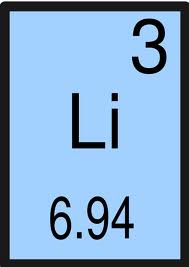Lithium Lowers Risk of Suicide
Suicide is a serious risk for people with mood disorders. We have noted before that various studies of lithium show that the drug lowers suicide risk in people with mood disorders. A 2013 meta-analysis by Andrea Cipriani et al. in the journal BMJ confirms this finding. The review of 48 randomized controlled trials comparing lithium with placebo or other active drugs in the long-term treatment of mood disorders showed that lithium reduces the risk of suicide and death from any cause.
Lithium was more effective than placebo at reducing number of suicides and deaths from any cause, and more effective than carbamazepine and anticonvulsants in general at reducing deliberate self-harm. The authors wrote that lithium seems to reduce risk of suicide and death by more than 60% compared to placebo.
Lithium may reduce suicide risk by preventing relapse of mood disorders, but it may also have other mechanisms of action, such as decreasing aggression or impulsivity.
One thing to note about these findings is that the reduction in suicide risk also applies to those with unipolar depression, not just those with bipolar disorder. There is a case to be made that lithium treatment could be targeted specifically to reduce suicide risk.
Minute Levels of Lithium in Public Water Supply Decrease Suicide
 Blüml et al. reported in the Journal of Psychiatric Research in 2013 that among 226 counties in Texas, the ones with higher trace levels of lithium in the public water supply had lower rates of completed suicide in the general population than did the counties with lower lithium levels. The naturally occurring lithium levels in public water supplies in the geographic regions described in this study ranged from 2.8 to 219 ?g/l or 0.00043 to 0.0315 mmol/l (much lower than the levels used to treat bipolar disorder).
Blüml et al. reported in the Journal of Psychiatric Research in 2013 that among 226 counties in Texas, the ones with higher trace levels of lithium in the public water supply had lower rates of completed suicide in the general population than did the counties with lower lithium levels. The naturally occurring lithium levels in public water supplies in the geographic regions described in this study ranged from 2.8 to 219 ?g/l or 0.00043 to 0.0315 mmol/l (much lower than the levels used to treat bipolar disorder).
This is the fourth positive study describing this effect, including two in Texas, one in Japan, and one in Austria. (One study from part of England failed to show this relationship, though levels measured in that study had a much lower and restricted range, from less than 1 to 21 ?g/l.) The most recent studies have collected more water samples and used more sophisticated statistical analyses to control for socioeconomic and a variety of other demographic effects on suicide.
Editor’s Note: Why higher trace levels of lithium occurring naturally in the water supply should have this anti-suicide effect in the general population is unknown, but it is a fascinating finding. It also gives indirect credence to the clinical findings in patients with unipolar and bipolar disorder that lithium (albeit in the much higher levels achieved with medication) has anti-suicide effects.
Lithium Reduces Suicide Rate and Increases Longevity
 Suicide is an unfortunate consequence of bipolar disorder in 10-15% of patients. A study by Manchia et al. examined suicidal behavior in 737 families of bipolar patients, including 4,919 first-degree relatives. Suicidal behavior ran in families and was more prevalent in those with an early age of onset and a shorter duration of illness. The good news: lithium treatment decreased suicide risk independent of its degree of effectiveness in treating bipolar disorder. Those on lithium also had a longer median age of survival (73 versus 65 years).
Suicide is an unfortunate consequence of bipolar disorder in 10-15% of patients. A study by Manchia et al. examined suicidal behavior in 737 families of bipolar patients, including 4,919 first-degree relatives. Suicidal behavior ran in families and was more prevalent in those with an early age of onset and a shorter duration of illness. The good news: lithium treatment decreased suicide risk independent of its degree of effectiveness in treating bipolar disorder. Those on lithium also had a longer median age of survival (73 versus 65 years).
Editor’s Note: These data are consistent with a variety of other studies and raise the question why lithium is used less frequently in the US than in many European countries and Canada. Given its neuroprotective effects, its prevention of suicide and dementia, and its positive effects on longevity, it is hard to see why lithium is not included in the treatment regimens of more patients (at whatever dosage is well-tolerated), even if it alone is not sufficient for treating their manic and depressive episodes.
Research (by this editor Robert Post and colleagues) shows that bipolar disorder is a more pernicious illness in almost all respects in the US compared to the Netherlands and Germany (International Journal of Neuropsychopharmacology, 2011). Whether bipolar illness would be less severe in the US if it were more often treated with lithium is an unanswered question. The field cannot provide an answer with systematic prospective controlled data, as most study designs would be unethical (i.e. would deny useful treatment to suffering patients), although one large randomized comparative study called BALANCE did show the superiority of lithium over valproate. However, individual patients in consultation with their physician could evaluate the evidence and request that lithium be considered in their treatment regimen.
If a patient has some clinical predictors of a likely good response to lithium, the decision to include lithium should be a slam-dunk. Some of these include: a positive family history of mood disorder, especially bipolar disorder; a classic course with distinct episodes and clear periods of wellness; manic episodes that are euphoric as opposed to dysphoric (i.e. anxious/irritable); lack of an anxiety disorder or substance abuse comorbidity; the absence of mood-incongruent delusions; and a sequence of episodes of mania followed by a depression and then a well interval (MDI) rather than the sequence of DMI.
Antiepileptic Drugs for Bipolar Disorder Do Not Increase Risk of Suicidal Behavior
![]() A 30-year observational study published by Andrew Leon and colleagues in the American Journal of Psychiatry has found that anticonvulsants used in epilepsy and for bipolar depression (carbamazepine, lamotrigine, and valproate) do not increase suicidal behavior in bipolar patients.
A 30-year observational study published by Andrew Leon and colleagues in the American Journal of Psychiatry has found that anticonvulsants used in epilepsy and for bipolar depression (carbamazepine, lamotrigine, and valproate) do not increase suicidal behavior in bipolar patients.
Editor’s Note: The FDA gave a warning in 2009 that these anticonvulsants were associated with suicidal ideation. This was based on studies of a mixed group of psychiatry and neurological patients in acute placebo-controlled studies, where suicidal ideation is typically a reason for exclusion from the study. Leon et al. used more powerful longitudinal methods to compare the risk of suicidal ideation in individuals taking and not taking anticonvulsants and found no such increase in suicidal behavior.
This is like the FDA warning for antidepressants and suicide, which was based on data from placebo-controlled clinical trials in acute depression (where suicidal patients are excluded). When investigators used the same longitudinal methods as Leon et al. in the anticonvulsant study, they found that antidepressants actually reduced suicidal behavior by 30%.
The bottom line is that the use of anticonvulsants for bipolar disorder should not be discouraged based on the FDA warning about suicidal ideation in mixed neurological and psychiatric patients. In bipolar patients, anticonvulsants do not increase the risk of suicidal behaviors, i.e. suicidal acts or completed suicides.
Despite the FDA Warning to the Contrary: Antidepressants Do Not Increase Suicidality
In 2007, the FDA began labeling antidepressants with a warning that patients aged 18-24 were at risk for increased suicidality during the first weeks of treatment. New evidence shows antidepressants actually have beneficial effects on suicide risk in adults. A study of all published and unpublished data on the SSRI fluoxetine (Prozac) and the SNRI venlafaxine (Effexor) published in 2012 by Gibbons et al. in the Archives of General Psychiatry showed that these antidepressants substantially reduced suicidal thoughts and behavior in adults and produced no increase in suicidal thoughts or behavior in children and adolescents.
The protective effect on suicidality in adults was mediated by mood, i.e. the patients’ mood improved and they became less suicidal. Children’s mood also improved on the antidepressants, but their risk of suicidal ideation did not change.
Editor’s Note: These are important findings. When the FDA box warning on antidepressants and suicidal ideation appeared, antidepressant treatment of youth decreased without an accompanying increase in psychotherapy, and the actual suicide rate in youth increased.
We now know that childhood-onset depression carries a bigger risk for a poor outcome in adulthood than adult-onset illness. In parallel, greater numbers of depressions are associated with more impairment, disability, cognitive dysfunction, medical comorbidities, treatment resistances, and neurobiological abnormalities.
It is important to treat illness in young people in order to prevent these difficulties, and the suicide warning should not deter the use of antidepressants. Patients should be careful about suicidal ideation in the first several months after starting an antidepressant, as other data suggest that this is a time of slightly increased risk of suicidal thoughts in children and adolescents.
Patients with Bipolar Depression Have a Higher Mortality Rate, Especially if They Also Have Cardiovascular Disease
In a large longitudinal study of depressed patients in Taiwan that was published in the Journal of Psychiatric Research this year, Chang et al. found that after 10 years, patients with bipolar depression (N=1,542) had significantly higher mortality rate than those with other types of depression (N=17,480). Patients with bipolar depression were twice as likely to have died from suicide or accidental death than were patients who had other types of depression. When cardiovascular disease was also present in both groups, patients with bipolar disorder were also four times more likely to have died from suicide or accidental death than those with other types of depression.
Editor’s Note: These data again emphasize the critical importance of patients with bipolar disorder carefully looking after their medical and cardiovascular health both early on and throughout the entire course of their illness.
Much of the excess medical mortality in bipolar disorder is attributed to cardiovascular disease, and now those with cardiovascular disease also appear more prone to suicide. This should be a call to action to improve the long-term treatment of both bipolar disorder and its common comorbidity, cardiovascular disease.
Get your medical illness treated!
It will improve your health and longevity. Especially treat these signs of the metabolic syndrome, a major risk factor for cardiovascular disease:
- Cholesterol–Increase “good” cholesterol (high-density lipoproteins or HDLs) and lower “bad” cholesterol (low-density lipoproteins or LDLs)
- High Triglycerides–Triglycerides should be below 150 mg/dL
- Blood Pressure–Aim for 130/85 mmHg or lower
- Blood Sugar–Fasting blood sugar (glucose) should stay below 100 mg/dL
- Overweight & Obesity–Keep waist circumference under 40” for men or 35” for women
Exercise is good for all of these!
Study Calls Into Question FDA Black Box Warning about Suicide Risk in Youth Taking Antidepressants
In 2004, the Federal Drug Administration issued a “black box warning” about increased risk of suicidal thoughts and behavior in children and adolescents taking selective serotonin reuptake inhibitors (SSRIs). See here for an overview from the National Institute of Mental Health.
An article published in the Archives of General Psychiatry earlier this year analyzed data from studies of fluoxetine and venlafaxine in youth, adults, and geriatric patients to determine if antidepressant use is linked to suicide. The drugs decreased both depressive symptoms and suicidal thoughts and behavior in adults and the geriatric population. They seemed to have no effect on suicidal thoughts or behavior in the youth.
For youths, no significant effects of treatment on suicidal thoughts and behavior were found, although depression responded to treatment. No evidence of increased suicide risk was observed in youths receiving active medication.
Antidepressants Prevent Suicide in Patients with Unipolar Depression
Researcher A. Kahn reported at the 51st Annual Meeting of the National Institute of Mental Health’s New Clinical Drug Evaluation Unit (NCDEU) in Boca Raton in 2011 that severely depressed and suicidal patients taking citalopram (Celexa) or a combination of citalopram and low dose lithium experienced improvements in depression and suicidal thoughts. This study was unusual because most clinical trials exclude actively suicidal patients. In the group of subjects receiving citalopram plus lithium (300 mg/day and achieving 0.5 mEq/l or higher), there were several indications of better anti-suicide effects than in those on citalopram alone. The authors concluded that with appropriate doses, antidepressants plus lithium may prospectively reduce suicidal thoughts, and that it is possible to conduct clinical trials in severely depressed and suicidal patients if adequate safety measures are included.
Surprisingly, improvement in suicidal ideation preceded improvement in depressed mood per se.
Editor’s note: The study reported here suggests that in those with high suicidal ideation scores at baseline, antidepressants with or without lithium may quickly bring about anti-suicidal effects on thoughts, desires, and behaviors. Whether these effects occur reliably in studies in other groups of patients and in younger individuals remains to be established.
These data are an interesting contrast to data on antidepressant use in those with low levels of suicidality at baseline. A number of studies have suggested that in children and adolescents who were exposed to an antidepressant, a small percentage experienced increases in suicidal ideation in the first two months of treatment compared to patients taking placebo. This led to a Federal Drug Administration (FDA) warning (directed at all patients taking antidepressants) that increases in suicidal ideation and action may occur upon starting antidepressants.
It is important to note that the warning does not refer to completed suicides; the data set that led to the FDA warning included no completed suicides. More than 70% of those with suicidal ideation do not make an attempt, and the vast majority of attempts do not result in a completed suicide.
Most of the studies that found the slight increase in suicidal ideation in some patients after beginning antidepressant treatment actively excluded acutely suicidal patients. Since the study of citalopram and lithium above used a population of severely depressed and suicidal patients and found that antidepressants improved suicidality, it appears important to consider a patient’s baseline state when considering psychiatric interventions. In another example, there is an interesting difference between the way depressed patients and non-depressed normal volunteers respond to one night’s sleep deprivation: depressed patients often show dramatic improvement, while normal volunteers tend to feel worse.
More Evidence that Antidepressants Prevent Suicide in Unipolar Depression
A new study by DeLeon published in the Journal of Clinical Psychiatry in 2011 found that during periods of life when unipolar patients were taking antidepressants (compared to times when they were not taking them) the patients experienced 20% fewer suicidal acts or completed suicides. Read more
Lithium More Effective than Valproate for Bipolar Disorder
 According to two studies in 2011, lithium is more effective in treating episodes of bipolar disorder than valproate, while the drugs may be equally effective in reducing suicidality among bipolar patients.
According to two studies in 2011, lithium is more effective in treating episodes of bipolar disorder than valproate, while the drugs may be equally effective in reducing suicidality among bipolar patients.
The first study, of more than 4000 Danish patients with bipolar disorder, found that patients taking lithium had fewer hospital visits and were less likely to need new medications than those taking valproate. Patients taking lithium had fewer admissions to a hospital for any type of episode. In addition, patients taking valproate had a higher rate of switching to or adding on treatment with antidepressants, antipsychotics, or anticonvulsants than those taking lithium. The study included up to 12 years of follow-up with the patients and is the largest study with the longest period of follow-up of patients taking valproate or lithium to date. Results were published by Lars Kessing et al. in the British Journal of Psychiatry in July 2011.
In the other study, a randomized controlled trial of 100 patients with bipolar disorder who had attempted suicide at least once in the past, Maria Oquendo of Columbia University found that there were no significant differences in number of suicide attempts, hospitalizations for suicide attempts, or time to a new attempt between patients taking lithium and those taking valproate over a follow-up period of 2.5 years.
Forty-five suicide events, which included attempts, hospitalizations, and changes to medication in response to suicide plans, were experienced by 35 patients (16 who were taking lithium and 19 who were taking valproate). Eighteen suicide attempts were made by 6 patients taking lithium and 8 taking valproate. There were no suicide completions during this study, which was published in Volume 168 of the American Journal of Psychiatry in 2011.
Editor’s Note: Suicide attempts are much more common than completed suicides. It appears that the second study was not large enough or long enough to detect differences in the rate of completed suicides. Older naturalistic studies suggest that treatment results in low suicide rates and that in patients who stop treatment with lithium, the rate of suicide attempts and completion increases dramatically. This is another reason for good responders to treatment regimens that include lithium to continue taking their medications.
Screening Tool for Depression and Anxiety Available via iPhone
My Mood Monitor, a website for mental health screening, has introduced depressioncheck, a free, mobile version of their M-3 Checklist, a scientifically validated screening tool for mood and anxiety disorders that can now be used via Apple’s iPhone and iPod Touch. It can be found in the Itunes App Store.
Adapted from the online version, the mobile version provides a short series of questions that measure indicators of mental health. Developed by a team of mental health practitioners and experts, the checklist takes only three minutes to complete. It is ideal to fill out in the waiting room prior to an appointment with a general practitioner so the doctor can be made aware of potential problems in the area of mental health. Depressioncheck is appropriate for those 18 years and older and its accuracy was confirmed in an article published in the Annals of Family Medicine in March 2010.
We recommend My Mood Monitor and the new mobile application as simple and reliable screening tools that can assess the presence of unipolar and bipolar mood and anxiety disorders, including obsessive-compulsive disorder, panic disorder, and PTSD. Read more







